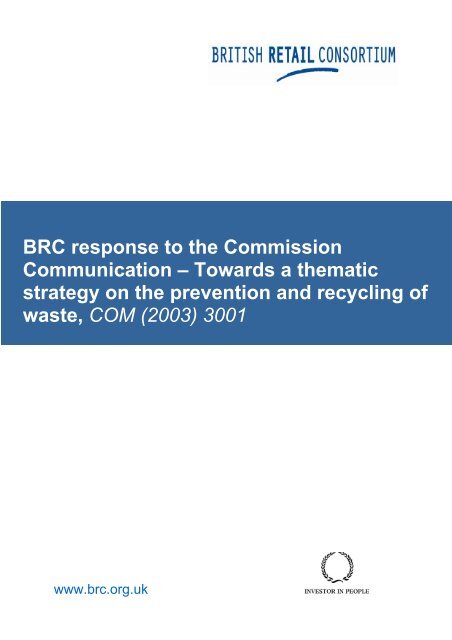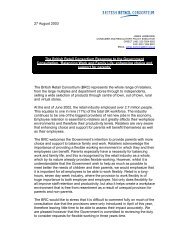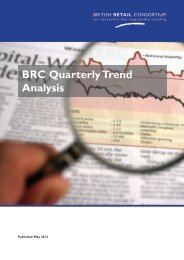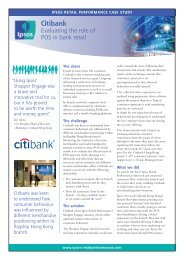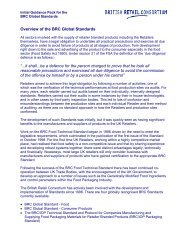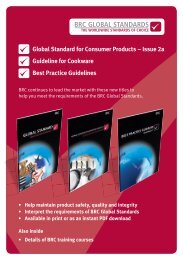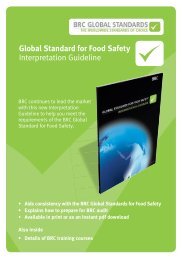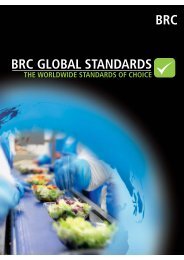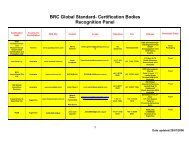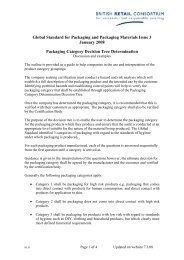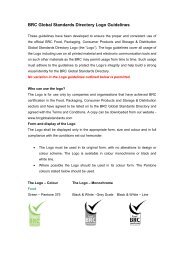1. General comments - British Retail Consortium
1. General comments - British Retail Consortium
1. General comments - British Retail Consortium
You also want an ePaper? Increase the reach of your titles
YUMPU automatically turns print PDFs into web optimized ePapers that Google loves.
BRC response to the CommissionCommunication – Towards a thematicstrategy on the prevention and recycling ofwaste, COM (2003) 3001www.brc.org.uk
The <strong>British</strong> <strong>Retail</strong> <strong>Consortium</strong> (BRC) welcomes the stakeholder consultation on theCommission Communication “Towards a thematic strategy on the prevention andrecycling of waste”, which might promote policy changes in the field of wastemanagement throughout the EU.The UK retail sector is a dynamic broad ranging industry known for its productivityand best global practice in supply chain, logistics and space management. As theinterface with the consumers the retailer plays a role in any thematic strategy onwaste prevention and recycling. The UK retailer and their first level suppliersaccounts for only 18% of the total waste produced in the UK. The majority of thiswaste is packaging and costs the industry approximately £ 12.3 (€ 17.6) million ayear. Consequently, waste management, waste prevention and recovery is of greatimportance for the retail sector.The BRC welcomes the opportunity to contribute towards the promotion of a EUthematic waste strategy. Based on our experiences, we recommend that theCommission takes note of the following key points:• Development of a strategy which includes clear definitions of role andresponsibilities for all stakeholders in the value chain and at the same timeallows flexibility for different solutions for the different markets and wastestreams throughout the EU;• Consumers play an important role in the successful implementation of anywaste management strategy, which includes changes in their daily patternstowards shopping for greener products and handling household waste. Newwaste initiatives need to be accompanied by national awareness campaigns;• The current lack of robust statistics and comparable figures on waste in theEU must be addressed before further proposals on target setting for wasteprevention and recovery are progressed. The focus should be on where thegreatest gain can be achieved;• There are a number of market driven tools and measures that can be takenforward in reducing the volumes of waste. There is a need for impactassessment, pilot projects and workability checks before any large scalepolicies are launched;• The UK national experience with tradable certificates in relation to packaginghas demonstrated the clear costs efficiency advantages in a market ledapproach. There are however a number of practical difficulties• Any recycling policy should be placed in a broader framework taking dueconsideration of the features and outcomes of the Commission initiatives inthe Integrated Product Policy and the Thematic Strategy on Natural ResourceUse, in order to avoid duplication and overlap with other EU legislation.<strong>1.</strong> <strong>General</strong> <strong>comments</strong>- 2 -
<strong>1.</strong> <strong>General</strong> <strong>comments</strong>The BRC supports the Commission’s aim for developing a more coherent approachto sustainable waste management. In doing so it is paramount that the definition ofwaste is adjusted and reflects the life-cycle thinking that has evolved since theadoption of the definition. At the brink of becoming a union of 25 Member States it isessential that the waste definition is workable and can be applied uniformlythroughout the EU. The BRC therefore looks forward to contributing to the wastedefinition debate the Commission intends to launch.A thematic waste strategy at the EU level should firstly aim at mapping out the longterm expected environmental outcomes in order to be able to assess and evaluatethe development. Furthermore, the selection of appropriate measures forimplementation needs to acknowledge the wide range of market driven andvoluntary based approaches, which combines economic and environmentalachievements.As part of the value chain retailers recognise that they have a role to play inminimising waste and promoting environmentally friendly production andconsumption. Consumers also play a key role in achieving sustainable wastemanagement and need to be engaged in order to make informed choices. The retailsector has been actively involved in dialogue and consumer awareness. There ishowever a need for the Commission and Member States to engage and take onresponsibility for stimulating changes and trends in individuals’ behaviour.2. Waste preventionThe UK retail sector in general, adheres to the waste hierarchy (Reduction, reuse,recover – recycling, composting, energy - disposal) in its waste management policy. Itis however used with flexibility, as it is not an efficient solution, which can be appliedwith equal success to all waste streams.Coordination of policies and strategiesThe BRC welcomes the Commission’s focus on promoting environmental products,which is the result of the recent Commission Communication on Integrated ProductPolicy (IPP) and the proposal for a framework directive on Energy Using Products(EUP).Several planned strategies, which the Commission is planning to present needs to becoordinated also with the view to avoid overlap with existing legislation. It isparamount that these initiatives are coherent and that the Commissioncommunicates clearly how they inter-relate.- 3 -
Best practice as a toolFor years now, retailers have been working on reducing the size and the weight ofpackaging, driven by cost savings. Consequently, waste prevention and reduction isan economic driver and the retail industry has many years of experience in this field.The Commission could be the facilitator for the exchange of these best practices.The attached case studies (See Annexe) emphasise that major retailers develop bestpractice and innovate in order to have a competitive advantage while still meeting theneeds of consumers. These examples demonstrate the reduction of waste to landfillin a cost-beneficial way and they have encouraged a cascade of best practicethrough the involvement of government funding via ‘Envirowise’.TargetsTargets have to be realistic and achievable. They must be based on soundenvironmental and economic that is cost/benefit assessments. Furthermore, it isimportant that waste targets should be set based on robust data that has industrysector agreement and confidence.The BRC supports the European commerce sector in its call for national cost benefitanalysis to be carried out, in order to define the recycling rate that matches the realityof the country and takes its specific circumstances into consideration.The difficulties of setting targets at European level are the disparities of definitionand methodologies used by the different Member States when defining collectionand recycling targets. The recycling rate is also different, which makes thecomparison between countries difficult if not impossible.3. Waste recyclingThere are both experiences from EU and national level in setting targets in thePackaging and Packaging Waste Directive. These experiences have illustrated thateven if the targets contribute towards promoting waste reduction and recycling itdoes not achieve a successful implementation across the EU. The way forward istherefore to ensure that a level playing field for managing waste is left at local andenterprise level.Future target settingEU wide recycling targets will not in itself guarantee that these targets will beachieved. As outlined above targets must be underpinned by a full cost benefitanalysis of the environmental/economic impacts. Before setting recycling targets it isnecessary to clarify what role and how the targets will work given that an EU of 25Member States with different waste management systems will need to be able tobenefit from and work within those targets.- 4 -
The BRC recommends that the Commission evaluates whether the environmentalobjectives are most efficiently achieved through EU wide targets.Landfill taxesIn 1996 the UK introduced a tax on waste, which is sent to landfill. It was initially setat a level designated to reflect the externalities not previously included in the marketprice of landfill. Increases in the landfill tax are designed to divert away from landfill toalternative treatment methods such as recycling, energy from waste and composting.Whilst landfill tax may fulfill the drive for some sectors of industry to increasetechnology and development, it should be seen as a measure, which needs to fit withother environmental incentives and schemes in order to ensure waste reductionthrough out the value chain of products.The environmental and economic effects of landfill taxes needs to be assessedtaking into account the contrasting waste management practices in the MemberStates. Classifications of waste across the EU vary, the countries use differentapproaches to the taxation of waste and some Member States do not apply a landfilltax. Agreement across the EU member states on a harmonised landfill tax could bean extremely cumbersome process.Shared responsibilitiesThe Commission has so far been regulating specific waste streams such aspackaging and packaging waste, end-of-life vehicles, waste of electrical andelectronic equipment (WEEE) and batteries and accumulators. Most of those wastestreams have strong links with consumer products. The principle of producerresponsibility has been a central plank of the EU legislation notably in the WEEEDirective. The principle does not however always imply an equitable division of coststhroughout the value chainThe BRC supports the concept of shared producer responsibility and recognises thatall stakeholders have a role to play including public authorities, manufacturers,retailers, consumers, NGOs, industry and central government. However, thedefinition of Producer and of Distributor is not clear or transparent in the existing EUwaste legislation and it is important to consult stakeholders concerned beforeagreeing on either of these definitions.The BRC encourages the Commission to consider the Best PracticableEnvironmental Option (BPEO) when defining producer responsibility. In the exampleof the WEEE Directive, there is no sound environmental or economic reason torecover and recycle all the many different types of electrical waste included. There isalso no existing system or any plan to encourage consumers to change their habitsand recycle electrical waste in the UK. The BRC therefore supports more flexibleprovisions for producer responsibility to ensure that the most environmental and costeffective solutions can be adopted in each Member state.- 5 -
Voluntary agreements around a framework of producer responsibility would be asensible way of achieving an overall improvement of their obligations in some casesfor example, in implementing the Batteries Directive. In this case, retailers play acustomer-facing role but cannot take responsibility for the collection and sorting ofwaste batteries and further processing in the recycling chain. This is especiallydifficult for small and medium-sized enterprises.The workability of the Packaging Waste Recovery Note systemIn the UK the Packaging Waste Recovery Note (PRN) is designed to make sure thatmoney is reinvested into the recycling infrastructure. Since 1997, in excess of £ 450(€645) million has been reinvested in UK recycling infrastructure as a result of thePRN system. The PRN system is based on the concept of shared producerresponsibility to ensure that the burden for recycling is shared among all businessesin the packaging chain. Around 9 million tonnes of packaging are produced in the UKeach year. Companies with a turnover exceeding £2 (€2,8) million and handlingover 50 tonnes of packaging material are legally obliged to demonstrate that they arepaying for the recovery and recycling of a specified proportion of their packagingwaste.While the BRC supports this market-driven approach in theory, we still see a numberof practical difficulties associated with transparency and policing the system:‣ The baseline data should be robust and have industry sector confidencebefore it is used as a basis to draw up targets. The UK figures for recycledwaste wood were overestimated by 76,400 tonnes for 2002 resulting in aninvestigation into accusations that PRNs had been inappropriately issued.This also threw data for wood into doubt.‣ The PRN system as it exists does not give businesses any certainty of coststo integrate into their business plans. Final costs are not clear until the end ofeach trading year. To build these costs into a ten or five year business plancan be almost impossible. Industry needs the certainty and confidence to planahead and invest in packaging recovery.‣ There is no transparency regarding the recycling of PRN revenue into wasterecycling initiatives or infrastructure. As ‘sellers’ in the packaging supplychain, retailers bear the largest obligation and should be rewarded for theirefforts to recycle or recover their waste.The BRC therefore recommends that the Commission consider these fundamentalissues before further considering the promotion of tradable permit schemes across allEU Member States. It is the role of the Government to ensure the supply anddemand dynamics are properly balanced, and where additional capacity is required,to ensure progressive target increases are sensibly planned and communicated asfar in advance as possible.- 6 -
4. Concluding remarksThe BRC recognises that the retail sector plays a role in reducing the environmentalimpact of waste. Waste management and the many areas of regulation havehowever emerged with such speed and frequency that it is a secondary business tothe primary one for retailers.The key challenge in tackling any waste related issues is to encourage a change inbehaviour. Market driven incentives will often be the main driver in promoting achanges. Whilst various mechanisms will achieve different shifts in behaviour it isnecessary to get the balance of the measures right:‣ Market: Waste prevention should be promoted on a voluntary basis allowingflexibility for market forces to drive waste prevention and recycling rather thantarget-driven goals. UK retailers are already promoting best practice in wastemanagement through improvements in packaging design technology.‣ Fiscal: Economic instruments can be a useful tool to promote environmentalimprovements. However, if the theory does not translate well into practicalapplication it can be more damaging than useful to both businesscompetitiveness and the environment.‣ Regulatory: Regulation backed up by proper enforcement can be effective inachieving environmental outcomes. However, regulation poses significantchallenges for SMEs and should recognise this.The BRC encourages the Commission to adopt a mixture of measures to driveimprovements in waste prevention and recycling. In doing so it is important torecognise and work with the complexity of these drivers in order to choose theoptimal combination. Although regulation might seem a practical tool it might not bethe most effective for the environment and the economy.The BRC further recommends that the Commission provides extensive research andstakeholder collaboration wherever possible to provide a stronger basis for thechoice of instruments to drive various mechanisms of the waste strategy forward,especially as applications will vary from one member state to another.5. For further information please contactJessica Faleiro, Environment Policy Executive: Tel. No: 0044 207 854 8927 orE-mail: jessica.faleiro@brc.org.ukMette Vadstrup-Madsen, European Policy Analyst: Tel. No: 0032 2 2308070 orE-mail: mvm@brc.org.uk- 7 -
Annexe with best practicesAnne Best Practice with BestPracticeBest practice with ReusablesA pharmaceutical retailer has developed a system for re-using the plastictransit trays for the delivery and display of its sandwiches without the needfor any alteration or redesign. The trays are no longer used just once, butare re-used at least three times. Broken trays are returned to the supplierfor recycling.The benefits have included:‣ Estimated savings of over £125000/year‣ Savings of approximately 200 tonnes/year of plastic‣ Savings of approximately 270 tonnes/year of cardboard‣ Reduction in the packaging obligation costs for the company and itssuppliersA fashion retailer, has a hanger Re-use scheme that some of its storesparticipate Annexe in. The with voluntary scheme Best is set Practiceup directly with the store’ssupplier to alleviate the problems of storing used hangers in the stores.Participating stores collect the hangers in re-usable boxes. The hangersupplier then collects the boxes from the central distribution site and sortsthem. Certain hanger styles are granulated and the store receives arebate for the scrap value. Other hanger styles are returned to stock andre-used.The scheme has generated a £175,000 rebate from hanger suppliers, ofwhich the stores have received £16,000 as incentives to participate in thescheme.- 8 -
Best practice in waste minimisationA major food retailer is currently pioneering recycling schemes for theircustomers, such as mobile phones and ink jet cartridge. Last year theyrecycled 350,000 phones and 35,000 ink jet cartridges, raising over £1mfor charity.<strong>Retail</strong>ers work on improving bag design and increasing the recycledcontent of carrier bags to reduce the environmental impact of packaging.An electrical retailer altered the design of its carrier bags in order toreduce the amount of material used per bag. The total weight of the oldspecification bags (based on use in 2001) was reduced by these changesfrom 690 tonnes a year to 428 tonnes a year - a saving of 262 tonnes ofplastic. This was achieved without impacting upon the strength of thebag.Envirowise is a government-funded body that works actively with theindustrial and commercial sector including retailers, supply chains andSMEs to provide free advice, practical guidance and information onwaste, water and energy. For example from February to September2003 they have identified £2.1 million of savings from working withseven major companies including retailers and their supply chains.- 9 -


